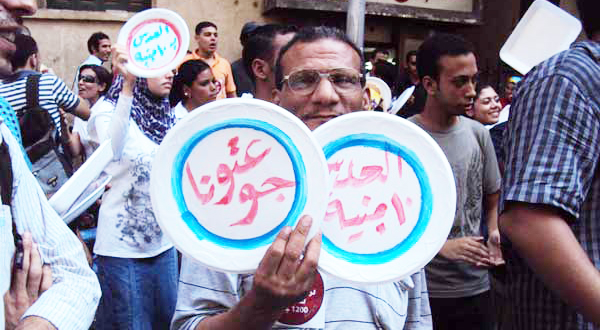 CAIRO: A small group of protestors held a sit-in in front of the Cabinet of Ministers on Monday against the significant increase in food prices before Ramadan.
CAIRO: A small group of protestors held a sit-in in front of the Cabinet of Ministers on Monday against the significant increase in food prices before Ramadan.
About 30 protestors waved empty plates, pots and spoons, while chanting slogans against the government, blaming it for the surge in prices.
“I’m telling the government that the people, who will barely survive Ramadan, will [revolt] if their economic situation doesn’t improve,” Karima El-Hefnawy of the Kefaya Movement for Change told Daily News Egypt.
Slogans were written on empty plates reading, “Where is justice?” and “You made us hungry,” among others.
“The prices [of food] are soaring; people can’t find the basic means they need to survive,” Abdel Aziz, a teacher participating in the demonstration, told Daily News Egypt.
“This government needs to change, its policies only benefit the businessman and the rich people, but other people get nothing,” he added.
Jihan Ibrahim, a student at the American University in Cairo who classifies herself as an “upper middle class citizen,” told Daily News Egypt, “Everybody is suffering. I admit we’re not suffering to buy bread, but my family is feeling [the increase in prices].”
“We have the power to decide what the prices should be. Anywhere around the world the prices are decided based on supply and demand; this is non-existent in this country,” she added.
Some government officials blame the surge in food prices on the corruption of vendors, who hoard goods for months and then sell them for higher prices when the demand rises.
The official news portal Egynews.net reported a surge in meat prices in different governorates. Prices went from LE 52 to 55 per kilogram, amid expectations that it will further rise to LE 60, it said.
“People can only afford to dream about meat now … buying it is out of the question,” Yasmeen Abdel-Moniem, member of April 6 Youth Movement, told Daily News Egypt.
The Consumer Protection Agency reported a price hike of 17 commodities from June and July 2009 to the same period this year. The increase ranges from 1.5 percent to 37.5 percent in state-run consumer outlets, including sugar, tea and flour.
The report added that the price of 11 commodities increased in super and hyper markets from 2 to 43 percent, while the price of five basic commodities decreased including lintels, and domestic broad beans.
Officials said the government is taking certain measures to cope with the increase in consumption during Ramadan, and the tendency to store food by consumers.
According to the Central Agency for Public Mobilization and Statistics, Egyptians spend LE 30 billion on food during Ramadan.
The state-run daily Al-Ahram reported early in July that the government would increase the supply of meat, poultry, fish, oils, rice and beans in order to keep prices low during Ramadan.
The government also said it would set up outlets that provide goods at prices 20 percent lower than their market price.
Last month, Prime Minister Ahmed Nazif stressed the importance of the commerce chambers in achieving market stability, and providing affordable goods with the required standards in order to protect consumer rights.
But the demonstrators didn’t sense any improvement in the prices and complained that there’s no balance between the wages and the food prices.
According to UN figures, one-fifth of Egypt's population of 80 million is living on less than $1 per day.
“We got an order from the Administrative Court to increase the minimum wage to LE 1,200 so they can be above the international poverty line which sets $2 a day for each person (as minimum wage), but the government hasn’t executed the verdict,” General Coordinator of Kefaya, Abdel Halim Qandil, told Daily News Egypt.
“The prices keep on going up and the wages keep on going down,” he added.
The administrative court issued a verdict on March 30 in favor of the Egyptian Center for Economic and Social Rights ordering the government to set a new minimum wage of LE 1,200 to accommodate the current costs of living.
So far, the government hasn’t complied comply with the court order.
The protestors were skeptic that the prices would go down anytime soon.
“In Egypt, there’s no such thing as prices going down …they only go up,” Abdel- Moneim told Daily News Egypt.



